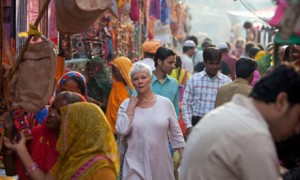 Most of my life, I’ve looked forward to growing old. It seems like it could be a kick, what with wearing clothes that shock the neighbors, developing unreasonable and unyielding demands, and devising new ways to irritate and embarrass my children.
Most of my life, I’ve looked forward to growing old. It seems like it could be a kick, what with wearing clothes that shock the neighbors, developing unreasonable and unyielding demands, and devising new ways to irritate and embarrass my children.
A good time, all around.
The Best Exotic Marigold Hotel, a film opening today, changed all that.
Billed as a quirky and whimsical comedy about growing old, it is so dull and unaware of its own messages that it passes being not funny and becomes downright depressing.
Suddenly, dying young doesn’t seem like such a bad idea.
The problem isn’t with the setup, at least in theory. Beset by financial woes, seven British retirees agree to “outsource aging” and move to a luxury hotel in vibrant India. The brain child of Sonny (a charming Dev Patel), the idea is that since industrious and creative Indians have taken on all the jobs Westerners no longer want to do, why not add caring for the elderly to the list?
It’s a classic fish out of water setup, flashing with vibrant saris and the aroma of spicy food.
Mrs. Greenslade (all the residents speak to each other using surnames, being British and all) has just lost her husband, only to discover that he left her no money and a pile of unresolved debts. She is played by the sublime Judi Dench. Maggie Smith plays Ms. Donnelly, a downright racist woman who plans to return to England posthaste as soon as those yucky Indian doctors replace her hip on the cheap.
The troop is rounded out by a retired judge (Tom Wilkinson), an unhappily married couple (Billy Nighy and Penelope Wilton) and a matched set of a lascivious playboy (Ronald Pickup) and gold-digging playgirl (Celia Imrie), who respect each other’s tactics but are not a couple.
The problem also is not with the lead Judi Dench. At 77, she has a fantastic assortment of wrinkles and more than a little thickness in the waist. Yet, with her big, blue eyes and expressive manner, she fills up the screen better than girls half – scratch that – a quarter of her age. I could watch her all day.
The British fish in Indian waters story is supposed to be whimsical and adventurous, but the decampment of elderly people to a whole new land never rises above mildly unsettling. Some of the characters have grown children, some do not, but in teeming India they are wholly alone. At least the aged Indians squatting in huts have family and friends who care if they live or die.
Ms. Donnelly, for instance, has a moment of unintended tragedy when she goes to the hospital, alone, to have surgery. She’s cared for, but there’s no one pacing the waiting room. After recovering, she returns to the hotel, alone. She is a woman with the entire Indian population to potentially serve her but not a single person to love her.
It’s not supposed to be heartrending, but it is. The very idea of having surgery without one caring friend or family member fluttering around to bring flowers, to harass the doctors, or to lie about how well I’m looking fills my heart with dread.
So much for magic and adventure. The film makes the case that one’s own flat with a nice cup of tea and a dear friend or two is worth more than the entire world, although it was trying to make the opposite case.
The second troubling ethos of the movie is the idea that these Baby Boomers, in their 60s and 70s, are still trying to find themselves. As the movie progresses, one gay character comes to terms with a romance of his youth and others come to terms with their failed relationships. Everybody embraces change and new frontiers. It’s supposed to be sweet, but it made me wonder how miserable their lives must have been for the last 50 years. All those decades were just wasted time?
Seriously, shoot me if I reach 70 and still am looking to find myself.
News flash for Boomers: You have already found yourself. Whatever you are, that is you. If you’ve embraced duty or shirked it, found love or avoided it, sacrificed for children or failed them, chased worthwhile passions or empty ones, that is you.
The end of life is for basking in the glow of a life well lived or atoning for failures – or probably for most of us – some combination of the two.
Listening to those seniors babbling on about new beginnings and psychoanalyzing themselves made me impatient with their selfishness. These characters are still very much the Me Generation, absorbed in contemplating the lint in their own navels.
At least one character, one you’d least expect, connects with another human being in a real way and finds a way to make herself useful to humanity in the time she has left.
She can come back to the West. The rest of the lot, they can just stay in India. Good riddance.
Rated PG-13 for (implied and discussed) sexuality and language.












